#poete gringoire
Text
i truly believe that pierre gringoire from notre dame de paris would make such an amazing member of les amis. i feel like he would be best friends with jehan, for he is also a poet (and is interested in middle ages lol). he would probably be one of the students writing vaudeville in that scene in musaine. he would be broke as fuck and probably he would be the only one who actually understood marius in his desperate love for cosette (as a person who forgot everything when he saw esmeralda like he just gets it you know. hopeless romantic and all that). i just love gringoire so much and i know his character must be developed a bit to match the vibe of les amis but still. let my boy in.
9 notes
·
View notes
Text
"All at once, she passed in front of Gringoire. Gringoire put his hand so recklessly into his pocket that she halted. "The devil!" said the poet, finding at the bottom of his pocket the reality, that is, to say, a void. In the meantime, the pretty girl stood there, gazing at him with her big eyes, and holding out her tambourine to him and waiting. Gringoire broke into a violent perspiration.
If he had all Peru in his pocket, he would certainly have given it to the dancer; but Gringoire had not Peru, and, moreover, America had not yet been discovered."
6 notes
·
View notes
Text
The catchiest of all the little recitatives of this show, lol. Decided to do them both and fortunately Tumblr now allows multiple audios, so why not? I also took the trouble to learn Fleur-de-Lys’ harmony, which actually sounds nice on its own. Neat.
Phoebus’ Name (Le mot Phoebus)
Esmeralda
Now, good sir, if I may inquire
The name of he to whom I am bound?
Gringoire
I am Gringoire, poet and squire
Troubadour and prince of the streets
Esmeralda
The prince of Paris’ streets, very meet
Gringoire
I am not a rake nor a lout
I would never wander about
With you as my lady
My queen
Esmeralda
If you’re scribe, then you can read
Then Gringoire, if you’d please heed my need:
What does Phoebus’ name mean?
Gringoire
Jove above me! Joking aside,
Who’d dare wear that name with such pride?
Esmeralda
One whom I do love above all
Gringoire
My Latin’s rusty, but I recall
Phoebus is the god of the sun
Esmeralda
Phoebus’ name means the sun
Lovely Like the Sun (Beau comme le soleil)
Esmeralda
He’s so lovely, like the sun
Bright and strong, a prince of love
Deep within me wakes a love
That grows and soars the skies above
For he’s lovely, like the sun
Bright and strong, a prince of love
My prince…my one
Fleur-de-Lys
He’s so lovely, like the sun
Strong and fierce, a rogue, a knight
In his arms, he holds me tight
It feels so wrong, it feels so right
But he’s lovely like the sun
Strong and fierce, my day, my night
My knight…my one
Both
He’s so lovely, like the sun
Bright and strong, my prince of love
He is mine, I’m all he is
And someday soon he’ll make me his
He’s so lovely like the sun
Wondrous man, my love, my one
He’s so lovely like the sun
Soon
He will be mine!
#notre dame de paris#beau comme le soleil#cristina sings#my lyrics#notre dame de paris english#nddp#had to figure out the rhyme scheme lol#whether to follow the french or do as the official english#i think it turned out ok
3 notes
·
View notes
Text
Heartbreaking betrayal
Natitoon
In the bustling streets of 15th-century Paris, the talented poet, minstrel, and playwright Pierre Gringoire found himself in the depths of despair. His heart had been shattered into a million pieces, for he had just discovered that his beloved wife, the beautiful gypsy girl Esmeralda, was in love with another man – the gallant soldier Phoebus de Chateaupers.
Pierre had always been a dreamer, lost in the world of words and melodies. He had poured his heart and soul into his art, hoping that it would be enough to win Esmeralda's love. But now, as the truth stared him in the face, he felt betrayed and heartbroken.
One evening, as the sun began to set over the city, Pierre confronted Esmeralda in their small, humble home. His voice trembled with a mix of anger and pain as he accused her of using him and playing with his heart.
"How could you do this to me, Esmeralda?" Pierre's voice cracked, his eyes filled with tears. "I loved you with every fiber of my being, and yet you chose another over me."
Esmeralda's eyes welled up with tears as she tried to explain herself. "Pierre, please understand. Phoebus and I share a connection that I cannot deny. But that doesn't mean I don't care for you. You are the father of our beautiful twin daughters, Djali and Marie Terise Antoinette. We can still be a family."
But Pierre's heart was too wounded to listen. He felt a deep sense of betrayal, and the pain was unbearable. Without another word, he packed their belongings into a sack, including their favorite toys – a wooden figure of a brown goat and a white rabbit made out of old rags.
With his daughters in his arms, Pierre made his way to the river Seine. He climbed into a small boat and began to row away from the city that held so many memories, both joyful and painful. Esmeralda stood on the riverbank, her tears flowing freely, as she watched her husband and children drift away.
As the boat moved further down the river, Pierre's heart ached with every stroke of the oar. He knew that leaving Esmeralda behind was the only way to heal his broken spirit. The pain of her betrayal was too great, and he couldn't bear to see her face every day, a constant reminder of his shattered dreams.
Days turned into weeks, and Pierre found solace in the quiet solitude of the river. He sang songs to his daughters, their innocent laughter filling the air. The wooden goat and the raggedy rabbit became their constant companions, bringing a glimmer of joy to their journey.
Though Pierre's heart remained heavy, he knew that he had made the right decision. He had to find a way to mend his broken spirit and find a new purpose in life. And as he rowed further away from Paris, he vowed to himself that he would never let anyone play with his heart again.
Meanwhile, Esmeralda stood on the riverbank, her heart heavy with regret. She had lost the man who had loved her unconditionally, and now she would never see him again. As tears streamed down her face, she whispered a silent apology to the wind, hoping that somehow, Pierre would find happiness and forgiveness in his new life.
And so, the boat disappeared into the distance, carrying Pierre, Djali, and Marie Terise Antoinette away from the city of love and into an uncertain future. The echoes of their story would forever linger in the streets of Paris, a tale of love, betrayal, and the resilience of the human spirit.
#esmeralda x pierre gringoire.#esmegore.#the hunchback of notre dame fanfiction.#my post#Pierre gringoire and Esmeralda had kids in this story.#Gringore takes the children.#phibous de Chateaupers is a jerk ladies's man. aka mr steal all the married or single woman in paris.#sad fic
2 notes
·
View notes
Text
i miss the original translation i had of hunchback of notre dame tbh!!! i don’t recall it exactly but it used the phase ‘in the tumult’ which charmed me for some reason as a teen
but most importantly, the early section where pierre gringoire, loser, loml, poet and playwright extraordinaire is distressed that nobody is paying attention to his play and are in fact leaving!!!! desperately seeks out the one person in the audience that criticised it to ask what he thought of it now that some time has passed since then
and the guy, bored out of his mind, says, well, it is stupid enough, and the narrator adds, pierre gringoire would have to be satisfied with that!
i just really liked the faint praise, whereas in the new translation, the guy says, somewhat sleepily, it is diverting. which idk doesn’t hit the same vibe, to me.
but the narrator continues to poke fun at pierre gringoire, so i guess it’s not too bad!!
but the original translation… i wish i had that book or knew who translated it!!!
2 notes
·
View notes
Text
Deleted “Play Within a Play” Sequence from my WIP Hunchback Adaptation
Hello! The following sequence was cut from the hunchback play I’ve been writing and revising. I felt that the audience spent too much time without seeing Gringoire after the “Sanctuary” scene, so I wanted to bring him back into the narrative in a natural way. Lacking any substantial scenes from the novel to adapt, I had to invent my own.
The conclusion I came to is the scene you’ll find posted here. The idea is that the aristocrats commission a play in honor of the pending wedding between Phoebus and Fleur de Lys, the sort of thing that was often the case in the Middle Ages.
Our Gringoire, of course, is the author who is commissioned to write it. However, his artistic integrity is somewhat compromised because his verses were revised and dictated by Fleur, making the play a thuddingly obvious condemnation of Phoebus’ infidelity.
This scene was one of my favorites that I wrote, because the imagery is very comedic and would work very well on stage. It’s also one of the only scenes that isn’t from the novel, but there is plenty of inspiration, and the style of drama is similar to Gringoire’s earlier work “The Good Judgement of the Virgin Mary” (which I call “The Judgement of Notre Dame” in my adaptation.)
Unfortunately, I found that this scene was fun in isolation, and it gave greater characterization to Fleur, but it dragged down the overall pace of the story. I’m in the process of cutting and massacring the play to be shorter and thus more appealing to publishers -- I may have to cut Jehan, sadly. Darlings like this have been casualties.
Enjoy!
{Scene: The Home of Aloise de Gondelaurier. Enter Gringoire, wearing a black cloak, from the left. He crosses to the center and bows.}
GRINGOIRE: In honor of the pending marriage between Fleur de Lys and Captain Phoebus, I have been commissioned to write a secular drama. Many of the verses were revised by the bride herself.
ALOISE: Aren’t you the fellow who balances on his head?
GRINGOIRE: No, I am Gringoire, the master poet and philosopher. (Gringoire folds his arms, causing his cloak to open, revealing his jester costume. The ladies giggle.) Start the show.
{Exit Gringoire. The musicians/actors gather their props and costumes. The actors assume the roles of a Greek Chorus, Apollo, Hera, and the Allegory of Loyalty. The Greek Chorus steps forward.}
CHORUS:
Hark to a tale as old
As the land and the sea
Of the burning sun
And lilies soft
A lover’s tragedy
A tale to whom
All may abide
If you are the groom
To a bride
{The Greek chorus steps back. The Allegory of Loyalty steps forward.}
LOYALTY: I am Loyalty. I am a friend to friendship and am wed to marriage. I am never asked for, but I am as expected as the rising of the sun.
{Gringoire enters, crouching across the stage and hiding his face. He is holding a stick with a crude picture of the sun on the end of it. The actor playing Apollo marches behind him triumphantly.}
APOLLO: I am Apollo, the God of the Sun. Who are you?
LOYALTY: I am the virtue of Loyalty. I pray that you take me into your heart.
APOLLO: Nay! I spit upon loyalty!
{Apollo takes the sun-stick from Gringoire, who crawls away and beats Loyalty to death with it.}
ALOISE: (Apprehensive) Fleur … did you write this part?
LOYALTY: (Collapsing) I am slain!
APOLLO: Good riddance to ye! The god of the sun has no use for the likes of Loyalty!
CHORUS: (Stepping forward)
From Mount Olympus
There came down
A goddess whom
Upon the sins of Apollo
She did frown
{The Greek chorus steps back. Hera steps forward.}
HERA: I am Hera, the goddess of marriage. I bore witness to the slaying of the Virtue of Loyalty, Apollo. It is most displeasing to me.
APOLLO: What care does the goddess of marriage have for loyalty?
HERA: I cherished Loyalty above all the virtues of the world. For your actions, I will curse you. (Hera raises her arms and wiggles her fingers rapidly. Apollo twitches and falls onto his stomach.) Upon thy belly thou shalt go, and dust thou shalt eat all the days of thy life.
APOLLO: Alas! If only I had taken Loyalty into my heart.
{The aristocrats applaud. Phoebus is uncomfortable. The actors bow and exit to the left.}
PHOEBUS: Fleur, did you write that ending?
FLEUR: A little bit.
11 notes
·
View notes
Photo
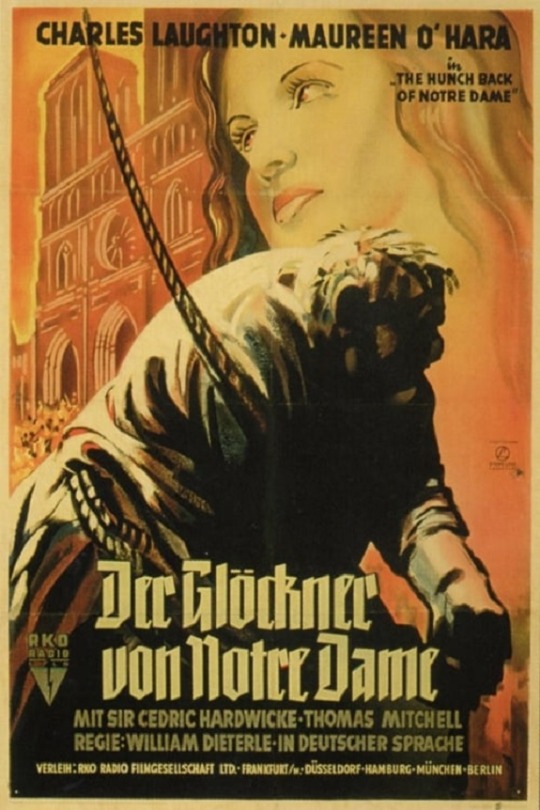

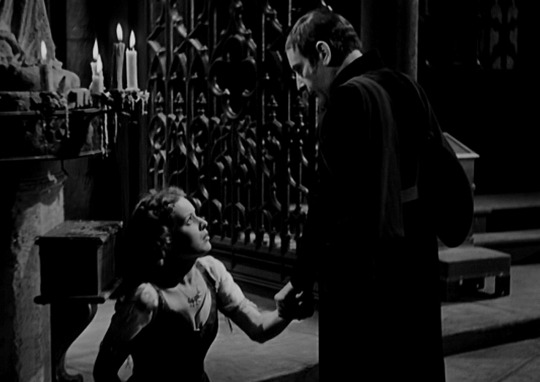
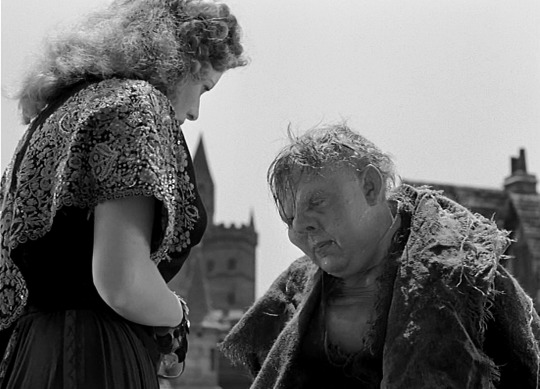

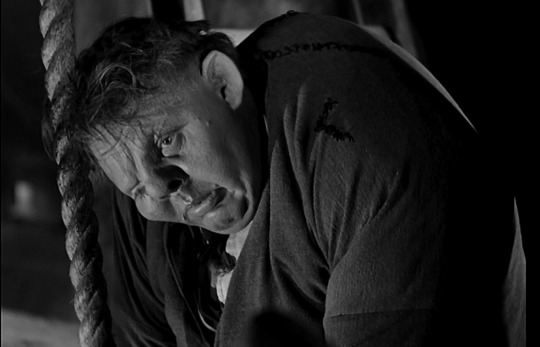
“Der Glöckner von Notre Dame” (1939)
Paris ist am Ende des fünfzehnten Jahrhunderts im Wandel begriffen. Die Erfindung der Buchdruckkunst durch Johannes Gutenberg, die auch in der französischen Hauptstadt Einzug gehalten hat, symbolisiert zwar den Anbruch einer aufgeklärteren und fortschrittlicheren Epoche, doch sind die Menschen allenthalben noch von Aberglaube und Vorurteilen beherrscht.
Die Zigeunerin Esmeralda (Maureen O’Hara) verschafft sich entgegen dem Bann, der für ihr Volk für Paris ausgesprochen wurde, Zutritt zu Paris und betet in der Kathedrale Notre Dame für die Verbesserung der Lebensumstände der Zigeuner. Dabei begegnet sie Frankreichs höchstem Richter Jean Frollo (Cedric Hardwicke), der sogleich in Leidenschaft für die attraktive junge Frau entbrennt.
Der fortschrittliche, junge Poet Pierre Gringoire (Edmond O’Brien) gerät durch Zufall in die Fänge des Bettlerkönigs Clopin (Thomas Mitchell) und ist dem Tode geweiht, doch Esmeralda verheiratet sich aus Mitleid mit ihm, um sein Leben zu retten, während Pierre sie aufrichtig liebt. Eine Zuneigung, die sie erst später erwidern wird.
Auf Frollos Geheiß entführt der missgestaltete und geistig zurückgebliebene Quasimodo (Charles Laughton), der Glöckner von Notre Dame, Esmeralda, wird aber bei seinem Vorhaben gestört, zur Strafe ausgepeitscht und der öffentlichen Demütigung durch die Bevölkerung preisgegeben. Lediglich Esmeralda empfindet Mitgefühl für Quasimodo und gibt ihm Wasser zu trinken. Ob dieser rührenden Tat ist der Bucklige nunmehr bereit, für die junge Frau alles zu tun.
Als Frollo Zeuge eines potentiellen Schäferstündchen zwischen Esmeralda und Hauptmann Phoebus (Alan Marshal) wird, ersticht er in rasender Eifersucht den Nebenbuhler. Der Verdacht fällt auf Esmeralda, die wegen Mordes vor Gericht gestellt wird, dem ausgerechnet Frollo vorsitzt. Esmeralda wird unter fadenscheinigen Begründungen und nach einem unter der Folter erzwungenen Geständnis zum Tode verurteilt, doch während der geplanten Hinrichtung entführt Quasimodo sie in die Sicherheit von Notre Dame ...
Der deutsche Emigrant Wilhelm Dieterle der seinen Vornamen zu William anglisierte, schuf 1939 eine zwar von der literarischen Vorlage mehrfach abweichende nichts desto trotz überaus eindrucksvolle Verfilmung des berühmten Romans von Victor Hugo, wobei vor allem die brillante schauspielerische Leistung von Charles Laughton als Quasimodo, die hervorragend choreographierten Massenszenen sowie die stimmungsvollen Kamerabilder von Joseph H. August hervorzuheben sind.
Dieterles Film mit einem Drehbuch des renommierten Exilautoren Bruno Frank strahlt trotz seines im 15. Jahrhundert angesiedelten Geschehens ein immenses Kolorit seiner damaligen Entstehungszeit aus, das in einigen Szenen geradezu beklemmend wirkt - so unter anderem wenn Quasimodo Esmeralda vor dem scheinbar sicher geglaubten Tod mit dem leidenschaftlichen Ruf “Asylrecht!” rettet, wenn Esmeralda die permanente Verfolgung der Zigeuner beklagt und Frollo Esmeraldas Volk in der Originalfassung als “böse Rasse” schmäht, die es zu vernichten gelte.
youtube
#the hunchback of notre dame#der glöckner von notre dame#charles laughton#maureen o'hara#cedric hardwicke#william dieterle
4 notes
·
View notes
Text
Now I hope you'll tell me please, who I'm honoured to be married to.
Gringoire poet please be at ease. Prince of Paris streets don't you know.
Prince of Paris streets, is that so?
0 notes
Text
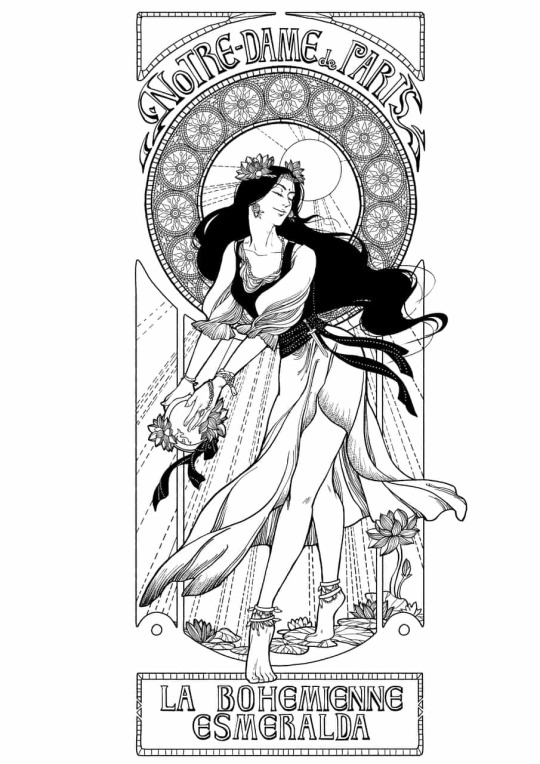
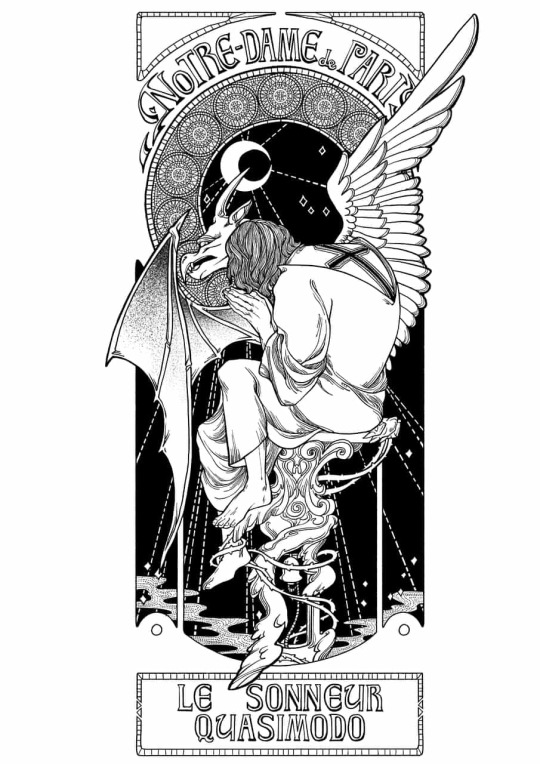


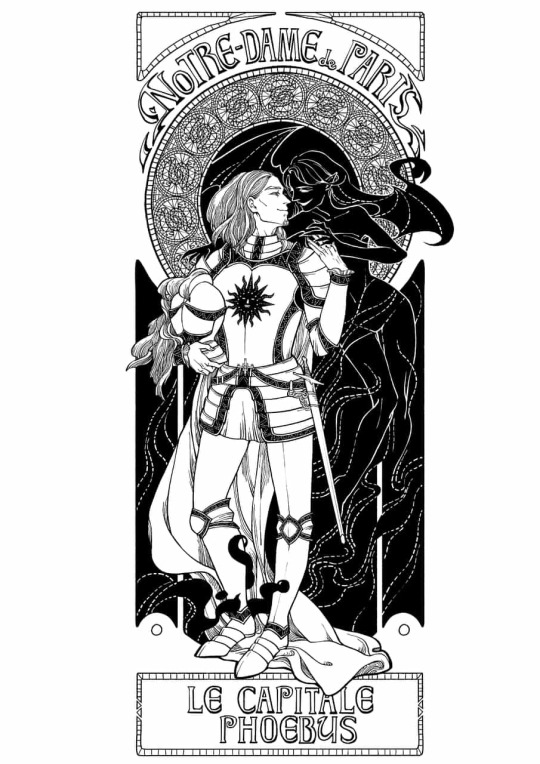
The main characters of Notre Dame de Paris.
Artist: AmelieWang on ART street
#notre dame de paris#the hunchback of notre dame#nddp book#nddp#hond#la esmeralda#esmeralda#dom claude frollo#claude frollo#frollo#phoebus#quasimodo#pierre gringoire#poete gringoire#gringoire
572 notes
·
View notes
Note
I heard you had a new art program, could you draw Gringoire with Djali from Notre Dame de Paris ? Just to test it 0:) Thanks
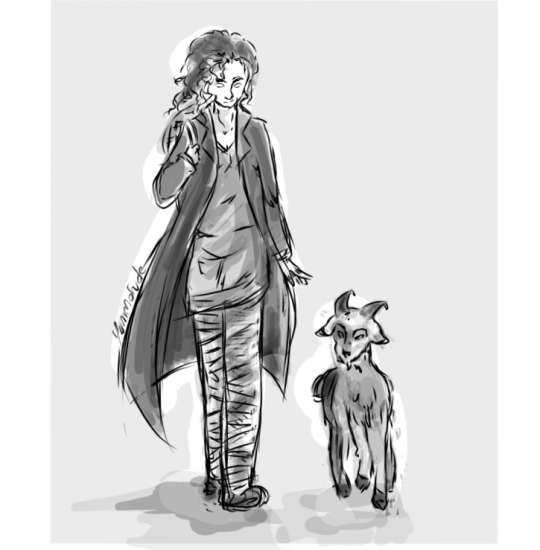
Thanks for your ask ❤
#notre dame de paris#nddp#ask#reply#gringoire#djali#victor hugo related#a poet and a goat#i guess#sorry if it's not what you wanted i was surprised by this ask#french literature#yumenodude#fanart#sketch
26 notes
·
View notes
Photo




We troubadours and poets sing that love is all and everything.
Park Eun Tae as Gringoire (Notre Dame de Paris, Korea 2008)
29 notes
·
View notes
Text
Top Five Favorite Books
TAGGED BY: @hmmm-what-am-i-doing
The Hunchback of Notre Dame
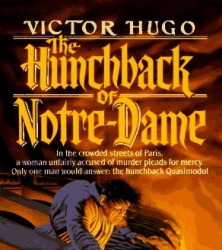
The other famous novel by Victor Hugo. Written in 1831, Notre-Dame de Paris, known in English as The Hunchback of Notre Dame, is a rich, meandering tale that addresses messy relationships, fate, and the future of architecture in 1482. The English title is a misnomer, since the protagonist of the story is Esmeralda, the original title being a metaphor on the cathedral who serves as the central location of the novel, and Esmeralda herself (though one could argue the cathedral is itself a character). Victor Hugo strongly protested against the English title, as it turns the focus from the cathedral onto the characters.
The hunchback is Quasimodo, the deaf, one-eyed, hunchbacked, monstrously ugly bell-ringer of Notre-Dame Cathedral in Paris. Abandoned outside the church at the age of four, he was taken in out of kindness by the Archdeacon of Josas, Claude Frollo, who raised him in the church and introduced him to the bells. When the hitherto chaste Frollo sees the romani girl Esmeralda dancing in the street one day, he finds himself stricken with lust, and doesn't know how to deal with it. So, sure as Love Makes You Evil, he grabs Quasimodo (for muscle) and tries to kidnap her. The attempt is foiled by Phoebus, Captain of the Archers. It is spectacularly not foiled by lovable slacker-poet Pierre Gringoire, who gets knocked out trying to save the girl.Later that night, however, Esmeralda temporarily marries the poet, to save his life from her friends at the Court of Miracles. That doesn't mean she's going to let her new "husband" touch her, mind you, or that she's going to give up her dreams of marrying Phoebus. Phoebus likes the look of her, himself, and although he's already engaged to his teenage cousin Fleur-de-Lys, he's not opposed to a bit on the side. Esmeralda's small kindness to Quasimodo when he is in the stocks for the kidnapping attempt (Frollo having let him take the fall) makes her an angel in Quasimodo's mind, and he is henceforth devoted to her. This eventually, and painfully, puts him in conflict with Frollo, whose combination of lust and loathing for Esmeralda makes him increasingly unstable. Amidst the drama and tragedy resulting from everybody's fatal obsessions, Hugo includes leisurely chapters on the architecture of Paris and the expected impact of the newly-developed printing press.
Frankenstein
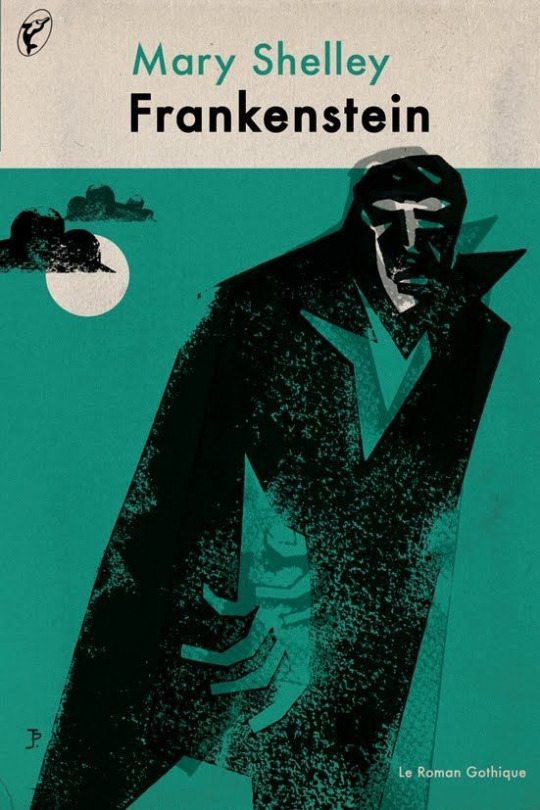
Frankenstein; or, The Modern Prometheus, usually abbreviated to Frankstein is a novel by Mary Shelley. It was originally published in 1818. It had a 1823 reprint without Shelley's involvement and a third edition in 1831, this time with significant edits from the author. Frankenstein is considered an Ur-Example of Science Fiction and inarguably has vast historical significance.
The novel tells of Dr. Victor Frankenstein who unlocks the secrets to Creating Life. He uses this knowledge to create an artificial man, larger and stronger than most mortals, by means which he chooses not to describe. While he is initially triumphant with his success, a few moments of observing the flailing and moaning patchwork being leaves Victor disgusted by and fearful of his creation. Realizing the ramifications of his success, he is horrified. He abandons the Creature and flees to his family's estate. In his absence, the Creature is forced to come to grips with suddenly finding itself alive and alone without explanation or guidance. He learns about humanity by watching a family cottage from afar, but is again driven off when he attempts to offer his friendship- one of many bad run-ins with humanity which leave the monster bitter and cynical. Eventually, the Creature comes to resent his creator, whom he views as his father, for abandoning the Creature to a life of torment, and decides to come home to seek vengeance against Frankenstein...
The subtitle, The Modern Prometheus, compares Victor Frankenstein to the Greek titan Prometheus, who brought the secret of fire from Mount Olympus to mortal men, reflecting on Frankenstein's spiritual would-be theft of the secret to creating life — but like Prometheus, Frankenstein also came to regret his transgression.note Many would say that Frankenstein was the ultimate warning of Science Is Bad, though similar stories were common throughout the industrial revolution and it is not even clear whether the act of creating the Monster was bad in itself, if the world wasn't ready for it, or Frankenstein was just a horrible and abusive parent.
One Hundred Years of Solitude
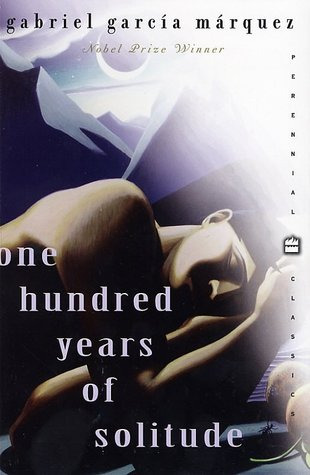
One Hundred Years of Solitude is a 1967 novel that won Gabriel García Márquez the Nobel Prize for Literature. It's become a staple of Spanish-speaking high school curricula everywhere. Arguably one of the most important pieces of literature written in the 20th century, or to put in context, almost as important as Don Quixote to Spanish speaking literature. Famous, among other things, for using every conceivable trope one could ever hope to fit in 28.8 oz of paper.
The book follows the story of the Buendía family and the town they create, Macondo, from its foundation to its end. Of course, it is told in a non-linear fashion with every generation having the same few names, as well as the same basic attributes (except for a pair of twins whose names are thought to have been accidentally switched at some point). Alongside the story of the Buendía family, there are an abundance of vignettes recounting both the everyday and the supernatural occurrences that shape the lives of the inhabitants of Macondo. The themes range widely, incorporating legendary figures (such as the Wandering Jew), historical events (Sir Francis Drake’s bombing of Rioacha, the Massacre of the Banana growers), and short stories about the love of two minor characters who never get to interfere with the main action. Believe it or not the story takes place in a time span of a hundred years.
Netflix has announced that it will be adapting the story into a television series.
The Arabian Nights
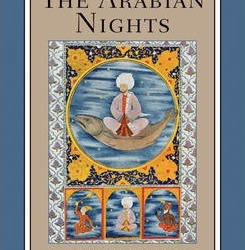
The Arabian Nights, correctly known as The Tales of One Thousand and One Nights (Farsi Hezār-o yek šab, Arabic Kitāb 'alf layla wa-layla), is a massive collection of Fairy Tales drawn from sources as far apart as the Middle East, North Africa, India, and, to an extent, even China and Greece. It has for centuries shaped the European view of the [relative to Europe] "(Near) East" or "Orient", even though only some of the stories are widely known. In fact, early Arabic-language versions only contain about 300 nights. The 701 others were added later; most of the additions were by Arab writers, but European translators added some other folktales they'd collected in their editions. Some of these additions were based on other Arabian sources, but others, including Aladdin and Ali Baba and the Forty Thieves, were stolen by Antoine Galland (the French translator) from Syrian Maronite writer Hanna Diyab, who recounted those tales to Galland and based them on various aspects of his own life. Diyab's autobiography was found in 1993 and greatly expanded our understanding of these stories.
The Framing Device for the story cycle is the tale of King Shahryar and Shahrazad. The King's first wife had cheated on him, so he had her executed. Then, feeling that no woman could be trusted, he hit upon a plan only a powerful and insane tyrant could pull off: He'd marry a woman, spend the night with her, and then, in the morning, send her off to the royal Wazir (chancellor) to be executed. No woman would ever betray him again! After a great many wives were executed in this manner (Richard Burton's translation says the King did this for three years, which would be about 1,100 wives), the Wazir was running out of marriage prospects to present to the King. Then the Wazir's daughter, Shahrazad, came to him with a plan. Since her plan involved marrying the King, the Wazir objected in the strongest manner possible, but nothing would deter the girl, and finally he brought her to the King.
Come the wedding night, once he started putting the moves on her, she feigned becoming upset, and pleaded to see her younger sister one last time. The King acquiesced, and allowed Shahrazad's sister Dunyazad to stay in the room with them until dawn. Even while they consummated the marriage. Awkward. After that and the three of them went to sleep, the sisters woke up at midnight. Just as planned, Dunyazad asked Shahrazad to tell her a story, but by the morning she was not finished, and ended the story on a Cliffhanger. The awoken King was so hooked on the story that he postponed the execution for one night, in order to hear the rest. But after Scheherazade ended that story, it was still the middle of the night, and she started up another story, again ending on a cliffhanger in the morning. The nightly routine continued. Some of the stories were simple, some complex and multi-layered; sometimes a character in one story would begin to tell a second story, and sometimes the story was never actually ended because Scheherazade had gone on two or three layers and never returned to wrap up. Or sometimes she claimed she didn't know the ending, but had another tale that was even more intriguing than the unfinished one. But all of the stories were so compelling that the King could never bear to order her execution without hearing the ending. So Shahrazad kept up the stories for three years — in the meantime bearing Shahryar three sons — and finally, after 1,001 nights, she said that she had told all of her tales and was ready to die. But the King had fallen in love with her, and had been calmed by her entrancing stories. He declared that no woman in the kingdom was as wise as Shahrazad, and he made her his queen for keeps this time, and they lived Happily Ever After.
Unlike many legends which deal primarily with the deeds of the nobility (who after all were the ones who could afford to have a bard as a permanent resident at their palaces), Arabian Nights has the fascinating twist that it covers people from myriads of occupations in a highly-complex society.
The Mysterious Flame of Queen Loana
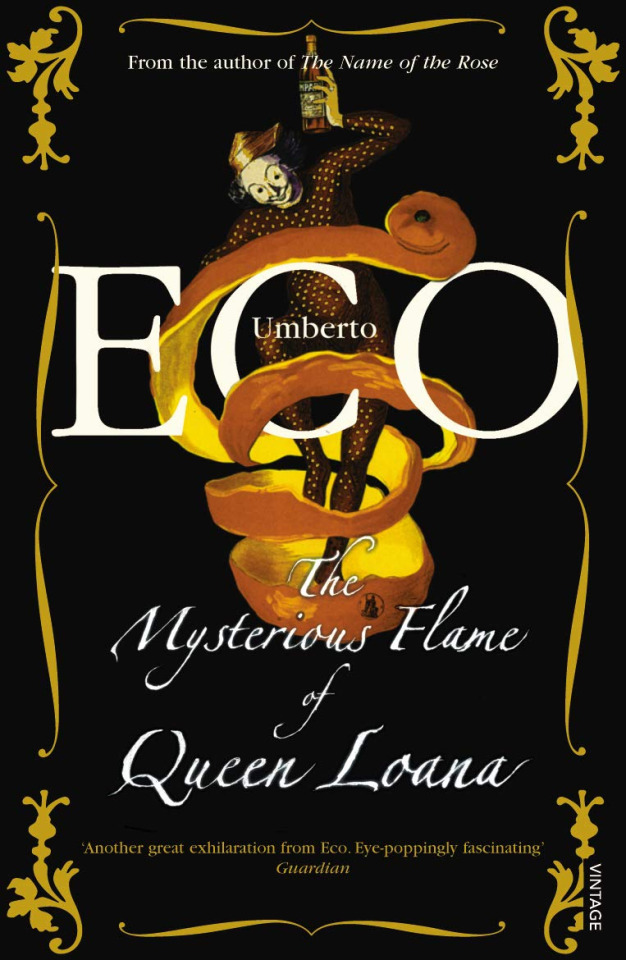
A novel by Umberto Eco.
Yambo Bodoni has a problem. After suffering a stroke, he lost his episodic memory. Now he can't remember his name, family, or any aspects of his life. Thanks to a lifetime of work as an antiquarian book dealer in Milan, however, he can recall anything he's ever read. In order to rediscover his lost past, Yambo heads to his childhood hometown of Solara. As he pores through old newspapers, comics, and magazines, Yambo - and the reader - get glimpses into the often tragic and bittersweet reality of a boy coming of age in Italy during World War II.
9 notes
·
View notes
Text
Chapter VI: Esmeralda
We are delighted to be able to inform the reader, that during the whole of this scene, Gringoire and his piece had stood firm. His actors, spurred on by him, had not ceased to spout his comedy, and he had not ceased to listen to it. He had made up his mind about the tumult, and was determined to proceed to the end, not giving up the hope of a return of attention on the part of the public. This gleam of hope acquired fresh life, when he saw Quasimodo, Coppenole, and the deafening escort of the pope of the procession of fools quit the hall amid great uproar. The throng rushed eagerly after them. “Good,” he said to himself, “there go all the mischief-makers.” Unfortunately, all the mischief-makers constituted the entire audience. In the twinkling of an eye, the grand hall was empty.
To tell the truth, a few spectators still remained, some scattered, others in groups around the pillars, women, old men, or children, who had had enough of the uproar and tumult. Some scholars were still perched astride of the window-sills, engaged in gazing into the Place.
“Well,” thought Gringoire, “here are still as many as are required to hear the end of my mystery. They are few in number, but it is a choice audience, a lettered audience.”
An instant later, a symphony which had been intended to produce the greatest effect on the arrival of the Virgin, was lacking. Gringoire perceived that his music had been carried off by the procession of the Pope of the Fools. “Skip it,” said he, stoically.
He approached a group of bourgeois, who seemed to him to be discussing his piece. This is the fragment of conversation which he caught,—
“You know, Master Cheneteau, the Hôtel de Navarre, which belonged to Monsieur de Nemours?”
“Yes, opposite the Chapelle de Braque.”
“Well, the treasury has just let it to Guillaume Alixandre, historian, for six hivres, eight sols, parisian, a year.”
“How rents are going up!”
“Come,” said Gringoire to himself, with a sigh, “the others are listening.”
“Comrades,” suddenly shouted one of the young scamps from the window, “La Esmeralda! La Esmeralda in the Place!”
This word produced a magical effect. Every one who was left in the hall flew to the windows, climbing the walls in order to see, and repeating, “La Esmeralda! La Esmeralda?” At the same time, a great sound of applause was heard from without.
“What’s the meaning of this, of the Esmeralda?” said Gringoire, wringing his hands in despair. “Ah, good heavens! it seems to be the turn of the windows now.”
He returned towards the marble table, and saw that the representation had been interrupted. It was precisely at the instant when Jupiter should have appeared with his thunder. But Jupiter was standing motionless at the foot of the stage.
“Michel Giborne!” cried the irritated poet, “what are you doing there? Is that your part? Come up!”
“Alas!” said Jupiter, “a scholar has just seized the ladder.”
Gringoire looked. It was but too true. All communication between his plot and its solution was intercepted.
“The rascal,” he murmured. “And why did he take that ladder?”
“In order to go and see the Esmeralda,” replied Jupiter piteously. “He said, ‘Come, here’s a ladder that’s of no use!’ and he took it.”
This was the last blow. Gringoire received it with resignation.
“May the devil fly away with you!” he said to the comedian, “and if I get my pay, you shall receive yours.”
Then he beat a retreat, with drooping head, but the last in the field, like a general who has fought well.
And as he descended the winding stairs of the courts: “A fine rabble of asses and dolts these Parisians!” he muttered between his teeth; “they come to hear a mystery and don’t listen to it at all! They are engrossed by every one, by Chopin Trouillefou, by the cardinal, by Coppenole, by Quasimodo, by the devil! but by Madame the Virgin Mary, not at all. If I had known, I’d have given you Virgin Mary; you ninnies! And I! to come to see faces and behold only backs! to be a poet, and to reap the success of an apothecary! It is true that Homerus begged through the Greek towns, and that Na
1 note
·
View note
Text
So, I’ve been listening to the Hunchback of Notre Dame off Broadway soundtrack a lot, and I’m having FEELINGS.
This got long so here is a cut in case you don’t want to read ramblings about Quasimodo and co.
I love the Disney movie and the off Broadway musical, but sometimes I wonder what they could have been if they had stuck closer to the book in some respects. Because, of course, Disney changed some stuff. I mean, it’s Disney, and they tend to avoid the more traumatizing aspects of the source materials so their young viewers don’t claw out their own eyes to keep them from seeing the horror. And most of the changes I am okay with. I like seeing Esmeralda being smart and a fierce champion of the outcasts, and I really like seeing her being nice to Quasimodo. I like sweet, innocent Quasimodo being naive and talking to statues. I like... okay I don’t like Phoebus being a hero or being The Love Interest. I hate that, actually. If they absolutely couldn’t bear to go all the way and make Esmeralda love Quasimodo, why oh WHY did they have to choose Phoebus, the handsome, strong, heroic soldier man? Having him turn out to be terrible underneath his beauty would have totally fit with the theme! And then they could have had poor stupid Gringoire be the romantic lead instead of ignoring him completely.
But okay, that’s not what I intended to talk about. Setting aside horrible Phoebus and his golden armor of LIES, the change I actually wanted to talk about was the relationship between Frollo and Quasimodo.
In the Disney movie version, Frollo kills Quasi’s gypsy mother and then when he sees little infant Quasi he is horrified and would have killed him as well except that the Archdeacon reminds him that God is watching. So Frollo reluctantly takes Quasi in, raises him in total isolation, and teaches him to be ashamed of what he looks like. Even the name he gives him is an insult, because it means “half-formed”.
In the musical, Frollo’s sinful brother asks from his deathbed that Frollo take care of his child, who turns out to be Quasimodo. Frollo declares that the infant’s deformity is God’s judgement upon his brother’s wicked ways. He then decides that God is testing him by sending him the monstrous child, and takes Quasi in to raise him and teach him “to think like me”. Again he keeps Quasi in total isolation in the bell tower and teaches him to be ashamed of his deformity. Again, the name is an insult and reveals Frollo’s casual evil.
In the book, however, Quasimodo is left in a spot in Notre Dame for abandoned babies. (This is after being switched by gypsies for a “normal” baby girl oooooooh foreshadowing...) Everyone is horrified by his ugliness and no one will adopt him, until young Claude Frollo wraps him up and carries him away. His only motivation is pity for the poor child who no one wants (which reminds him of his young brother he loves with all his heart, who could have suffered the same fate). He gives him a name that both commemorates the day he found him - Quasimodo Sunday - and which means “almost like”, as in almost like a child. It’s maybe not the best name, but it isn’t meant as an insult. He cares deeply for Quasi, and tries his best to raise him well. He does not lock Quasimodo away and forbid him from ever leaving the bell tower. But whenever Quasi does go out, the townspeople are terrible to him because of his ugliness. Children even like to run up and stick pins in his hump. He has also been deafened by the bells he loves so much, so finds communicating with people very difficult. The only person he can really talk to is Frollo, who uses gestures to help him understand.
Now, I’m definitely not trying to defend Frollo or do the whole “he’s just misunderstood” and that makes everything okay. But I do love a complex villain, and Frollo is not simply evil. He is actually very compassionate and tries really hard to be a good man of the church, a good brother, and a good surrogate father. He’s just also kind of unhinged, and can’t deal with failure. He hates his failure of being unable to turn his brother away from debauchery, hates that he failed to make Quasimodo more normal, and then later hates that he failed to resist the temptation of Esmeralda. It’s only when his frustration and impotence overwhelm him that he uses his position in the church for selfish ends, and uses Quasimodo’s love for him to do wrong. And Quasimodo does love him. In the movie and musical, when Quasi turns on Frollo and kills him it is played as triumphant; finally he sees that Frollo is evil, has never really cared for him, and has been lying to him his whole life. But in the book, when the deed is done Quasimodo acknowledges that he loved both Esmeralda and Frollo, and with them dead he has nothing left. It’s heartbreaking. And I wish we could have had some songs about all THAT.
#hunchback of notre dame#quasimodo#claude frollo#esmeralda#phoebus#that dick#pierre gringoire#my idiot son#my trash poet#disney#musicals#as much as i love the song out there#it really lets the townspeople off the hook#they were dicks too#complex villains
0 notes
Text
1939 Hunchback of Notre Dame Deleted Scenes:
The following scenes are present within the screenplay, dated around July 1939 (shortly before principal photography began on the film). Some of these may have been shot, while others may have never been filmed.
- When the band of Gypsies are halted from entering Paris at the city border, the patriarch of them points out how the guards who are forbidding them are of non French ethic backgrounds, groups that were once persecuted like the Gypsies, but the soldiers continue to refuse their entrance. In the film, this scene is much shorter. (“You came yesterday, we come today”)
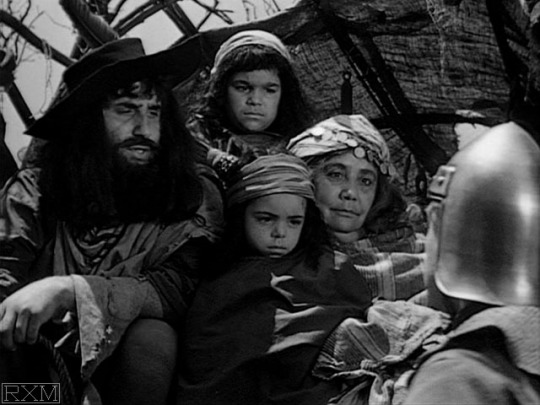
- alternate scene of the woman being frightened by Quasimodo. In the script she is a pregnant woman who is mildly concerned, and in the film she is terrified and runs to her grandmother for comfort.
- Frollo and the king converse in the king’s private box during the festival. Frollo is bigoted and dismissive of the heresy of the festivities, and the king is surprised to see Frollo accidentally smile at a person balancing on a ball.
(The shot of a man balancing on a ball is used during the festival montage sequence. This, to me, suggests that this scene was filmed, but removed and altered in the editing process.)

- The introduction of Captain Phoebus. He, along with his fiancé Fleur de Lys, her friend Aloise, and the soldier Philippe exchange small talk at the Festival of Fools. Aloise thinks Gringoire is handsome, and Phoebus belittles him, saying that anybody can write verse poetry.
(A publicity still exists of the scene, implying that it may have been filmed)

- Pierre Gringoire’s play is a much longer sequence, and is politically subversive, showing how the laboring classes provide for society while the clergy and nobility do nothing. The nobles are outraged by the heresy, but the king argues that such offensive ideas are important to listen to. The play also contains scenes of the roman gods.
(All of the actors and their character-appropriate costumes appear in the final film, which means that these scenes could conceivably been filmed, and later deleted for pacing reasons.)
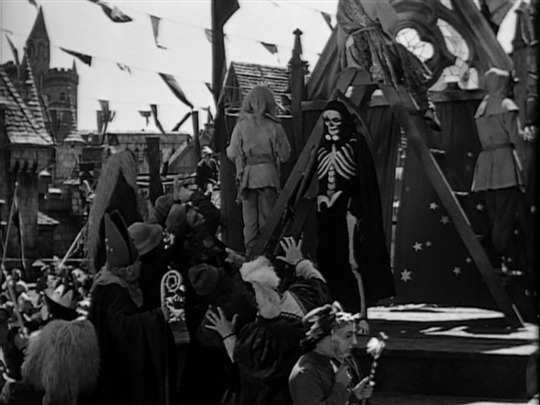
- When Esmeralda first claims “sanctuary” in Notre Dame, there is a notably etended scene of her talking to King Louis XI. The script makes it clear that she wishes for the king to advocate for the rights of the Gypsies, and of herself. Only a small portion of this scene is in the final film.
- Gringoire wanders the streets after his play is failed and city doesn’t pay him for it. He offers to write poetry for a serving of chicken, but the food vendor cannot read so he refuses the offer.
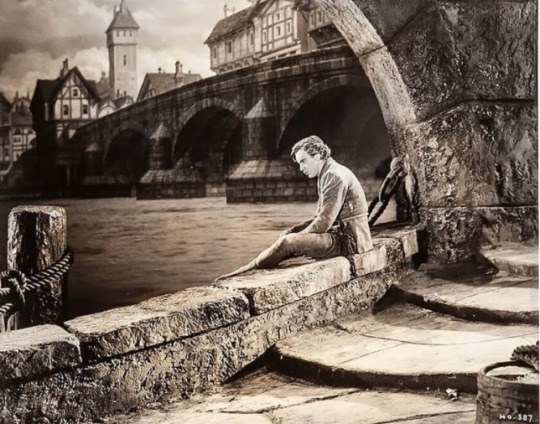
- during the trial of Gringoire, several candidates, one of them named “ugly Madeline” show vague interest in the poet but don’t want to marry him because he’s not attractive enough.
- as a wedding present, Esmeralda is given a monkey named bimbo. The monkey is seen and even named in the final film, but the context of its presence is never given.

- during the pillory sequence, a pair of nuns recite Quasimodo’s backstory (told in flashbacks), how he was adopted by Frollo and outcast by the world.
(The 1996 restored score to the film has the music run much longer than the filmed scene, implying that the pillory sequence was originally longer)
- The planning of the birthday party of Fleur de Lys. She and her companions dream of the party later that night, and Fleur demands a fortune teller be invited. Phoebus brings her a birthday gift.
- after being whipped, Quasimodo sulks in the bell tower to lick his wounds.

-The party of the nobles is extended. More scenes of Fleur de Lys and her companions
- Clopin and the beggar Queen show up to the party, disguised as the count and countess of Mendozza. They steal a jewel from Fleur’s mother.
- Love scene between Phoebus and Esmeralda is extended. More romantic dialogue. She has him pose and walk around to look tall, as in the novel. Esmeralda eventually tries to refuse him, because she suspects that he is in love with Fleur de Lys.
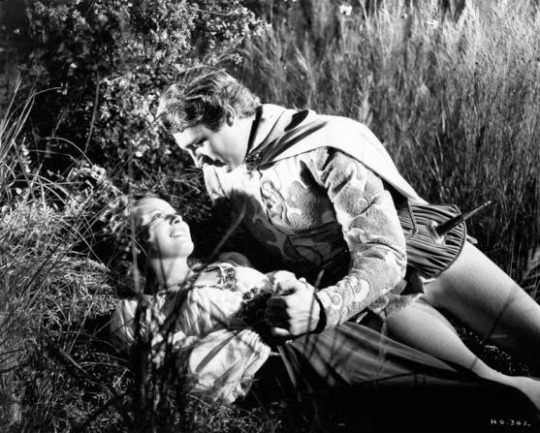
- Quasimodo watches the events of the party from the heights of Notre Dame, as he is still processing his feelings of love for Esmeralda. When she is arrested, that is when he begins to madly ring the bells of the church as in the film.
- extended sequence of Quasimodo trying to take the blame for Phoebus’ murder. The jury is thrilled at the prospect of Quasimodo being executed. Frollo dismisses this evidence on the grounds that the hunchback was ringing the bells at the time and sends him to be held in his office.

- While Esmeralda is being tortured, Frollo watched from a secret door in his office. Quasimodo keeps trying to convince Frollo that he is the murderer, by presenting his master with a knife that he supposedly used.
- After the procurator reads Esmeralda’s sentence in Latin, the king remarks how unfair it is that criminals are not even allowed to know what they are guilty of in their own language and how this issue must be reformed.

- During the preparation to execute Esmeralda, Fleur feels sorry for the Gypsy girl. She says that if she never invited her to her party, then both she and Phoebus would have lived. Her mother, named Heloise in this version, chastises her for such pity.
- After rescuing Esmeralda, Quasimodo rings the bells in triumph while she is asleep. Frollo enters, trying to find the Gypsy, and Quasimodo threatens him by using the rope of a bell like a bullwhip.
- When Clopin rallies his people to seige the church, a character named Mathias (Mathias hungadi?) stirs up support by mentioning all of the plunder to be had.
- The archbishop, on his way to warn the king of the upcoming uprising, runs into Clopin, and tries to talk him out of assaulting the church.
- Clopin’s death was originally much closer to the novel, where he would be killed by the king’s soldiers while swinging a sickle and urging his people to fight on.
- The original ending. Frollo tries to assault Esmeralda and Quasimodo intervenes. The hunchback, though stabbed by Frollo, pushes his master off the cathedral. Frollo dangles on an architectural projection, and eventually falls to his death, like in the book.
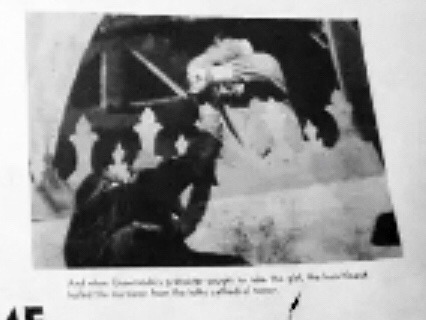
- Before she leaves, Esmeralda comforts Quasimodo, unaware he is dying.
- Quasimodo rings the bells one final time before he dies alone of his injuries.
(This scene is described in a rare set of press materials, and the following photo that accompanied it imply that it was filmed. In addition, some of the shots of Quasimodo in the final film feel like insert shots in hindsight. The image quality is quite poor, but these are the only images I have been able to discover.)

Side note: This deleted ending is taken almost beat for beat from the 1923 silent version, which this film was greenlit and advertised as a direct remake of. Ironically enough, most of the elements of this version that were inspired from that film, such as the ending and the addition of a Beggar Queen character, were largely excised from the final product.
#hunchback of notre dame#deleted scenes#victor hugo#1939#charles laughton#research#this isn't an exhaustive list#but I think its more than passable#playing historian can be fun
44 notes
·
View notes
Text
get to know me even more
tagged by the lovely @everybody-koiya - thanks!
ONE | name / alias: I call myself Helen in English because it is the closest equivalent of my Russian name, which is Alyona. My main nicknames are ellenoruschka (which I use practically everywhere online) and shadowofthemoth; but irl there are friends who call me Gringoire and the Prince (can you possibly guess where this is coming from?.. Yeah, thought so).
TWO | birthday: July 19
THREE | zodiac sign: Cancer
FOUR | height: 163 cm
FIVE | hobbies: reading, writing poetry, writing fanfiction, drawing, dancing, swimming, roleplaying as my favourite characters... playing the guitar and singing, even though I am far from being good at either occupation.
SIX | favourite colours: all shades of blue, green, violet, purple, grey.
SEVEN | favourite books: “Bambi” by Felix Salten, “The Lord of the Rings” by JRRT, and actually many many many others, I won’t list them all here because I count them by dozens.
EIGHT | last song listened to: “Master of the Wind” by Manowar.
NINE | last film watched: watched because I wanted to or because I happened to? These are different... And I don’t really watch them all that often. But the last thing I watched was “Good Omens”, yeah.
TEN | inspiration for muse: literally everything, but there’s always a 70% chance that this something has at least something to do with musicals.
ELEVEN | dream job: a singer/actor in musicals. Which will never happen, because alas! I sing atrociously. I love my current job though, being an English teacher is fun.
TWELVE | meaning behind your URL: shadowofthemoth? Oh, very easy. Look at my userpic, see that silhouette of a finger butterfly? This is Morpho, a symbol of my favourite rock band Poets of the Fall. I mimicked the structure of the band’s name (”X of the Y”), took the word “moth” because I love moths as a symbol... and the idea behind the word “shadow” was inspired half by the photo I use as a userpic, half by the thought that I am exactly that: not even a moth but merely its shadow, something so very tiny and insignificant... but imagine a moth without a shadow and the world becomes unsettling; think of the so-called “butterfly effect” and imagine what change could the absence of just one moth bring about. Yeah.
And also I just think moths are cute. XD
Tagging: @thehellsingalchemist, @blackrosehunter, @lucrezianoin, @peachofhighgarden (no obligation though, do this only if you want to!) and literally whoever feels like doing this - would love to read about you all guys!
Kisses ^^
11 notes
·
View notes